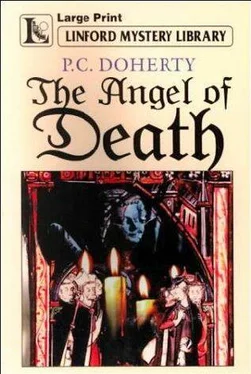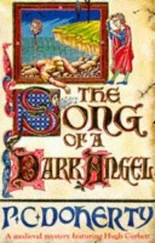Paul Doherty - Angel of Death
Здесь есть возможность читать онлайн «Paul Doherty - Angel of Death» весь текст электронной книги совершенно бесплатно (целиком полную версию без сокращений). В некоторых случаях можно слушать аудио, скачать через торрент в формате fb2 и присутствует краткое содержание. Жанр: Исторический детектив, на английском языке. Описание произведения, (предисловие) а так же отзывы посетителей доступны на портале библиотеки ЛибКат.
- Название:Angel of Death
- Автор:
- Жанр:
- Год:неизвестен
- ISBN:нет данных
- Рейтинг книги:4 / 5. Голосов: 1
-
Избранное:Добавить в избранное
- Отзывы:
-
Ваша оценка:
- 80
- 1
- 2
- 3
- 4
- 5
Angel of Death: краткое содержание, описание и аннотация
Предлагаем к чтению аннотацию, описание, краткое содержание или предисловие (зависит от того, что написал сам автор книги «Angel of Death»). Если вы не нашли необходимую информацию о книге — напишите в комментариях, мы постараемся отыскать её.
Angel of Death — читать онлайн бесплатно полную книгу (весь текст) целиком
Ниже представлен текст книги, разбитый по страницам. Система сохранения места последней прочитанной страницы, позволяет с удобством читать онлайн бесплатно книгу «Angel of Death», без необходимости каждый раз заново искать на чём Вы остановились. Поставьте закладку, и сможете в любой момент перейти на страницу, на которой закончили чтение.
Интервал:
Закладка:
'Sir Philip,' he said softly, 'who would want de Montfort dead?'
Plumpton turned, his face beaming with pleasure. 'I for one.'
'You did not like the dean?'
'No,' he said, 'I did not like the dean, a mysterious, strange man. I would have liked his post, the office of dean. It should have been mine anyway.'
Corbett was slightly taken aback at such a disclosure.
'And how many more disliked him?'
Plumpton spread his hands and gazed around. 'The cathedral is a small city in itself. There is the bishop, the dean, the treasurer, the sacrist, the almoner, the librarian. We have our servants, those who clean the church, those who serve us here. Our huntsmen, our washerwomen, our messengers, our tailors. I don't think you'd find one who liked Master de Montfort or who is going to weep copious tears because he is dead.'
Plumpton sipped from his cup and peered closely at Corbett. 'And you, Master Clerk, do you think it was an accident? I have heard say you announced it as murder. It is murder, is it not.'
'What do you think?' Corbett asked. 'Who would murder the Dean of St Paul's?'
Plumpton grinned again.
'Why not ask your master, the king,' he said.
Corbett placed his hand firmly on Plumpton's arm. 'Sir priest,' he said, 'some men would say that was treason.'
Plumpton slowly removed Corbett's hand. 'Some men, Master Clerk, say it is the truth.' He gazed steadily at Corbett. 'Why not ask your king? After all, was it not Bassett who brought a flagon of wine, the best Bordeaux, as a gift from your royal master, just before mass began?'
Corbett stared back. 'I did not know that.'
'There are many things that you did not know,' the priest replied peevishly. He suddenly raised a beringed hand and snapped his fingers. A servant, one eye covered by a black patch, shuffled forward. Corbett looked at him, the emaciated face, the long lank hair, the greasy leather jerkin and canvas apron tied around his waist.
'Simon,' the priest said softly, 'is my servant. Simon has something to show you.' He whispered into the servant's ear, the man nodded and shuffled away.
Corbett turned back to the table where around him the general hum of conversation was unbroken; people ignored him, intent on filling their own bellies and acquiring some warmth against the savage cold outside. The wine was now circulating freely and already some of the canons looked the worse for wear, bleary-eyed and droop-mouthed. Corbett knew the king would stay here most of the day, intent on showing he had nothing to hide or fear, and would be only too willing to relax and feast himself on the riches of the Church. Corbett would have liked to go but waited until the servant reappeared. In one hand he carried a cup, in the other a leather pannikin of wine. Corbett looked at the cup, which was empty: a simple design, made of good-quality pewter. The pannikin was of leather lined with gilt; the stopper of hard-boiled polished leather fitted the top snugly. Corbett had seen many such used around the royal palace. He looked at the cup, sniffing at the brim and caught a faint but strange smell. He then uncorked the pannikin of wine and the bitter sweet smell almost made him choke. Plumpton watched in amusement.
'They are yours, Master Clerk. That smell, this morning in the sacristy, it is the same now. I am sure, Master Clerk,' Plumpton continued smoothly, 'that if you took a gulp of that, you would not leave this hall alive. But they are yours. I give them as a free gift, for in the wrong hands they could well be used as a weapon against the king.'
Corbett nodded. 'I will not forget,' he said. He replaced the stopper carefully, making sure it was screwed in tightly, rose and without a word to Plumpton or his shadowy servant, walked from the hall, with both cup and pannikin concealed beneath his robe.
5
Corbett walked out of the warm chapter-house and into the icy cold cloisters. It was now bitterly cold; the sun had set and a grey dusk was closing in. Flurries of snow fell, adding a fresh carpet to what had come before. An unnatural stillness hung over the cathedral grounds, as if the snow had blanketed everything under a canopy of peace; yet Corbett knew different. Only two years ago the king had ordered a high wall to be erected around the cathedral, strengthened by gates which were locked every night and opened only when the bells rang for prime. Here were men who had fled from the law, seeking sanctuary: the scum of London, broken men declared 'utlegatum' – beyond the law. They came here untroubled by royal officers or other city officials. Through the falling flakes, across the graves and mounds now hidden by the snow, Corbett could see the great stone wall and the makeshift shelters erected against it. Men, women and children, faint figures swathed in skins and rags, like those in a nightmare, slipped silendy by. He saw the dim glow of fires and heard the cry of a baby, painful against the encroaching freezing night. A hopeless scene. The grounds were taken up by the dead and used by those who lived in a sort of half-dead state.
A dreadful place, Corbett concluded, it evoked the old demons in his soul. He remembered a friend, an Arab physician whom he had once met years ago in London, talk of a sickness of the soul which excited the base humours of the body; the mind became clouded and eventually it led to suicide. Corbett thought such a nightmare always awaited him, that he would settle in some black fit of depression and, unable to continue, simply lie down and die. The graveyards and grounds of the Cathedral of St Paul's evoked these demons: here, in Christ's house, where Christ lived, his figure perpetually crucified, the priests fed like pigs, their bodies, sleek, fat, plump, clothed and warm; while the poor, like the cat he had seen earlier, squatted where they could, eating what they had scavenged.
Corbett passed a group of horses tethered together, waiting for their masters to finish their feasdng, the grooms long since disappeared. Corbett rounded a corner and entered the south door of the cathedral. On either side of the gloomy entrance were small wooden iron-barred gates leading to the tower. Corbett ensured these were fastened. He didn't know why, but he simply did not want to pass a door which might be open, for he could not shake off a feeling of evil, of watchful malice. He walked up into the nave. On either side of him the transepts were shrouded in darkness, the stout rounded pillars standing like a row of silent guardians, thrusting the mass of stone, as if by magic, up into the air. The place was deserted. Usually, this market-place of London would be packed by scribes, lawyers, parchment-sellers, and servants. Here men would come to talk of lawsuits and crop prices; women had neighbourly chats even while divine service was being celebrated, sometimes only becoming quiet when the host was elevated. St Paul's was a useful meeting-place where enemies might confer on safe ground; arbitrators decide a land quarrel; a young man with marriage on his mind arrange to meet a young girl and her family.
Corbett jumped as the great bell of St Paul's began booming out, a sign that the curfew would be imposed, the gates locked and chains laid across them to deny access to any of the roaring gangs of lawless youths who terrorized the city at night. It was cold, deathly cold. Corbett walked on past the small, shadowy embrasures where the chancery priests sang masses for those who paid money to escape God's judgement for their sins on earth. He climbed the steps into the choir; on either side the wooden stalls were empty, the carved gargoyles staring in motionless terror towards him. Wall torches still spluttered faintly, throwing deep shadows and giving the patterned stone-work a life of its own. Corbett entered the silent sanctuary. Here too, torches fixed into their iron sockets in the wail provided a little light. Corbett looked up at the high altar which had been cleared. The sacred vessels were now covered with a thick, dark cloth, though the incense from the morning mass still hung in the air like souls who refused to ascend to heaven.
Читать дальшеИнтервал:
Закладка:
Похожие книги на «Angel of Death»
Представляем Вашему вниманию похожие книги на «Angel of Death» списком для выбора. Мы отобрали схожую по названию и смыслу литературу в надежде предоставить читателям больше вариантов отыскать новые, интересные, ещё непрочитанные произведения.
Обсуждение, отзывы о книге «Angel of Death» и просто собственные мнения читателей. Оставьте ваши комментарии, напишите, что Вы думаете о произведении, его смысле или главных героях. Укажите что конкретно понравилось, а что нет, и почему Вы так считаете.












